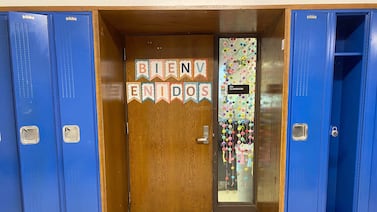The Newark Board of Education approved a resolution that outlined the district’s obligations to meet the needs of students who are learning English, including a commitment to give those students priority for in-person instruction when the district switches to remote or hybrid learning.
The district also promised to implement “steps to find and engage” English learners “who lost contact with district schools during the pandemic,” especially its youngest students, those who lacked internet access, and older students who are at risk of dropping out, the resolution states.
The 15-point resolution, approved at a board meeting last week, restates responsibilities the district is required to meet by state and federal law, such as screening students to identify English learners and providing teachers of English learners with relevant professional development opportunities. The responsibilities of the district to that group of students, who make up one-fifth of the student population, have also been outlined in a settlement agreement with the U.S. Department of Justice, which the board approved in the fall.
“This resolution is really intended as a reaffirmation of the value of the great diversity that we have in our schools and the importance of equity, specifically here with respect to our English language learners,” said board co-vice president Vereliz Santana before the vote on the resolution.
Santana added that the resolution models a recommendation from the Education Law Center, the N.J. Consortium for Immigrant Children, and the N.J. Teachers of English to Speakers of Other Languages/N.J. Bilingual Educators.
Those three groups jointly published a report in November that highlighted the ways districts throughout New Jersey, including Newark, routinely failed to meet state regulations for educating students with limited English proficiency, especially during the pandemic and remote learning.
Affirming the rights of English learners in the district “is a great first step,” but it’s crucial for the school board to also enact policies that will ensure the district follows through on the commitments made in the resolution, said Lady Jimenez Torres, policy director for New Jersey Consortium for Immigrant Children, in a statement emailed Sunday.
Newark Public Schools was recently the subject of a four-year investigation by the U.S. Justice Department, which uncovered wide-ranging failures to properly serve English learners, a violation of the Equal Educational Opportunities Act of 1974. That federal law states that schools must remove any language barriers that limit students’ access to instruction.
The investigation found, among other violations, that the district under-identified students who required language support, placed English learners in schools without adequate services, and failed to hire and retain enough qualified teachers. The justice department will be monitoring the district at least through 2024 to ensure it complies with the obligations summarized in the agreement.
At the board meeting, Santana spoke about her experience when she was a young English learner struggling to learn the language and almost held back as a first grader.
“My mom did everything possible to make sure that I made it to the finish line that year,” Santana said. “I can’t imagine how difficult it would have been if we were in a pandemic at that time. I doubt I would even be here if that were the case.”
Here are a few more obligations outlined in the resolution:
- To continue recruiting bilingual and/or Black, Indigenous, and people of color throughout the school workforce to ensure a reflection of Newark’s diverse student population.
- To ensure that parents and caregivers whose primary language is not English receive communication in a language they understand.
- To foster the involvement of parents of English learners in the development and review of school programs, and to share information to their communities, including through a parent advisory committee.
- To avoid any practices that could stop undocumented students from enrolling, and to refrain from requesting immigration-related documents in order for a child to enroll or stay in school.
- To follow principles that minimize the risk of families coming into contact with the U.S. Immigration and Customs Enforcement. These principles include prohibiting ICE agents from entering school grounds or accessing school records unless absolutely required by law.








